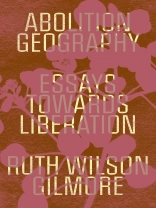Gathering together Ruth Wilson Gilmore’s work from over three decades,
Abolition Geography presents her singular contribution to the politics of abolition as theorist, researcher, and organizer, offering scholars and activists ways of seeing and doing to help navigate our turbulent present.
Abolition Geography moves us away from explanations of mass incarceration and racist violence focused on uninterrupted histories of prejudice or the dull compulsion of neoliberal economics. Instead, Gilmore offers a geographical grasp of how contemporary racial capitalism operates through an ‘anti-state state’ that answers crises with the organized abandonment of people and environments deemed surplus to requirement. Gilmore escapes one-dimensional conceptions of what liberation demands, who demands liberation, or what indeed is to be abolished. Drawing on the lessons of grassroots organizing and internationalist imaginaries,
Abolition Geography undoes the identification of abolition with mere decarceration, and reminds us that freedom is not a mere principle but a place.
Edited with an introduction by Brenna Bhandar and Alberto Toscano.
लेखक के बारे में
Ruth Wilson Gilmore is Professor of Earth & Environmental Sciences, and American Studies at the Graduate Center of the City University of New York, where she is also Director of the Center for Place, Culture, and Politics. She is the author of Golden Gulag: Prisons, Surplus, Crisis, and Opposition in Globalizing California. Honors include the American Studies Association Angela Y. Davis Award for Public Scholarship (2012); the Association of American Geographers’ Harold Rose Award for Anti-Racist Research and Practice (2014); the SUNY-Purchase College Eugene V. Grant Distinguished Scholar Prize for Social and Environmental Justice (2015-16); and the American Studies Association Richard A Yarborough Mentorship Award (2017).





![का आवरण Sarah B. B. (University of Central Florida, Orlando, FL, USA) Bush & Kristin L. L. (Bellarmine University, USA) Cook: Simplifying STEM [6-12] का आवरण Sarah B. B. (University of Central Florida, Orlando, FL, USA) Bush & Kristin L. L. (Bellarmine University, USA) Cook: Simplifying STEM [6-12]](https://static.worldofdigitals.com/thumb_webp/414/9781071932414.webp)






